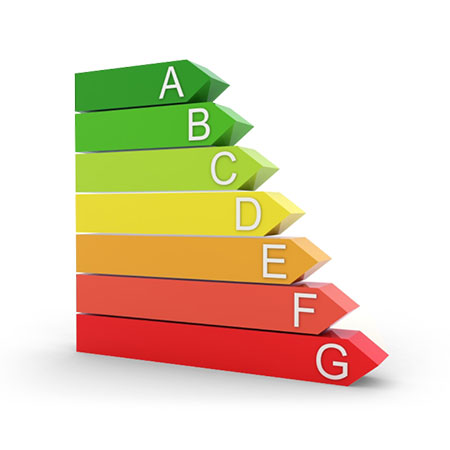What is a commercial energy performance certificate? (and do I need one)

Did you know that buildings account for 39% of the energy-related carbon dioxide emissions annually.
Climate change, and the efforts to tackle it are becoming increasingly important. And the Scottish Government is taking a measured and targeted approach to ensure they meet the targets they committed to – an 80% reduction in Scotland’s overall emissions by 2050.
In order to help buildings reduce their emissions, Energy Performance Certificates (EPC), became a legal requirement in Scotland in 2009, under The Climate Change Act Scotland 2009.
In this blog, we’re going to explore what an Energy Performance Certificate (EPC) is, specifically a commercial EPC. This will help you understand what they are, why they are necessary and how to go about getting one.
Do you need to get a commercial EPC?
Since January 2009, it has been a legal requirement for commercial buildings to have an EPC if they satisfy all of the following requirements:
- They are conditioned ie. any form of heating, mechanical ventilation or air cooling system
- They are over 50m²
- They are let or sold
New and modified buildings also require a commercial EPC, so if for example additions to the HVAC systems are made, an EPC will need to be produced.
Your property’s EPC needs to be available to potential buyers as soon as you start to market your property for sale or rent, to allow a comparison of the energy efficiency of different properties easily. Plus, if the building is public, you are required to display the EPC in a place that it can be easily seen.
In addition to the EPC, non-domestic property owners will have to produce a Section 63 Action report, and will then have 42 months from the date of issue to implement any changes. This is a legal obligation, laid out in the The Climate Change Act Scotland 2009, with Section 63, specifically focussed on assessing and improving the energy performance of non-domestic buildings.
What is an energy performance certificate?
An Energy Performance Certificate (EPC) is a document that rates how energy efficient your building is using a traffic light system from A to G. With A being the most efficient.
The EPC will provide an indication of how much it should cost to heat and power a property. And it will include recommendations on how to improve the energy efficiency, the cost of carrying out these improvements and the potential energy savings that these improvements could result in.
Bear in mind that these improvements are suggestions, and based on typical usage. They are not tailored to your particular building and usage. The improvements are also not legal obligations, unlike in the Section 63 action plan. They are merely suggestions for you to take on board if you wish to reduce your bills and carbon emissions (however non-domestic property owners will require both a EPC and Section 63 Report).
If you do implement any of the energy efficiency recommendations it’s worth producing a new EPC, so these improvements are available to any future renters of buyers.
In a nutshell an EPC will help you to:
- Understand the energy performance of your property
- Identify areas that energy efficiency could be improved in
- Make improvements to save money and reduce emissions
EPCs are valid for 10 years from the date of issue and they are a legal requirement for most buildings (commercial and domestic).
However, for the rest of this article we are going to be focussing on the commercial EPC, as the requirement, the process and the cost can vary in comparison to a domestic EPC.

Are there any exemptions to the Commercial EPC?
There are some scenarios that will mean that buildings are exempt from the commercial EPC requirements and do not need one. If your building is:
- temporary (in use for less than two years)
- a standalone building with a total floor space of less than 50 m².
- listed/conservation area/officially protected and the minimum energy performance requirements would unacceptably alter it
- used as a place of worship or for other religious activities
- an industrial site, workshop or non-residential agricultural building that doesn’t use much energy
- due to be demolished by the seller or landlord and they have all the relevant planning and conservation consents
If these are the case then you will not need to produce an EPC.
Who can produce an EPC for you?
In Scotland, only accredited and appropriately-trained commercial energy assessors are permitted by law to produce commercial EPCs.
Hardies Property & Construction Consultants have a number of experienced Chartered Surveyors who are fully trained and accredited Commercial Energy Assessors. We cover all areas of Scotland and would be happy to provide you with advice and free quotations for the production of any Commercial (or domestic) EPC you may need.
What is the cost of an EPC?
There is no set cost for an EPC, and it will depend on a number of factors. A commercial EPC will likely involve multiple hours on site, and the assessor will need to collect a large amount of information about the building.
Typically the inspection will involve a full measured survey, noting details of various constructions, window and door details, glazing analysis, boiler efficiencies etc.
The information will be entered into Government-approved software known as iSBEM. SBEM (Simplified Building Energy Model) was developed by the Building Research Establishment and uses the National Calculation Model to produce the EPC rating.
For this reason, a commercial EPC is likely to be more expensive than a domestic EPC, due to the increased level of detail and the need for a more technically competent assessor.
A Commercial EPC will usually cost you somewhere in the region of £450 – £1400. However, each property will be appraised individually, so this may be subject to change.
Of course, on top of the price of the EPC, there are other cost implications.
The non-domestic EPC outlines key areas for improvement, alongside the typical costs for improvement and the savings that could be achieved from these energy saving measures.
Implementing the improvements is not a legal requirement. However, they will help you save money through building energy efficiency, and may make it more attractive to buyers or renters. This may allow you to recoup some of the initial outlay costs.
Plus, there are the environmental considerations. The EPC exists to help drive down the effect of buildings on Climate Change. The EPC allows you to take steps as a building owner to reduce your carbon footprint, which for many people is priceless
And of course, as the EPC is a legal requirement there are also financial implications if you don’t produce a report. You can be fined up to 12.5% (up to a maximum of £12,500) of the property value if you do not comply.
In summary: What is a non-domestic energy performance certificate?
Most commercial properties will require an Energy Performance Certificate by law (in addition to a Section 63 Action report).
The EPC will help property owners to identify any holes in the energy performance of the building, and provide voluntary suggestions to improve the energy rating of the building. Therefore contributing to the Scottish Government’s efforts towards tackling Climate Change.
Hardies Property & Construction Consultants have a number of experienced Chartered Surveyors who are fully trained and accredited Commercial Energy Assessors.
If you would like to find out how we can help then get in touch. We cover all areas of Scotland and would be happy to provide you with advice and free quotations for the production of a commercial EPC.


[…] What is a commercial Energy Performance Certificate (and do I need one)? […]